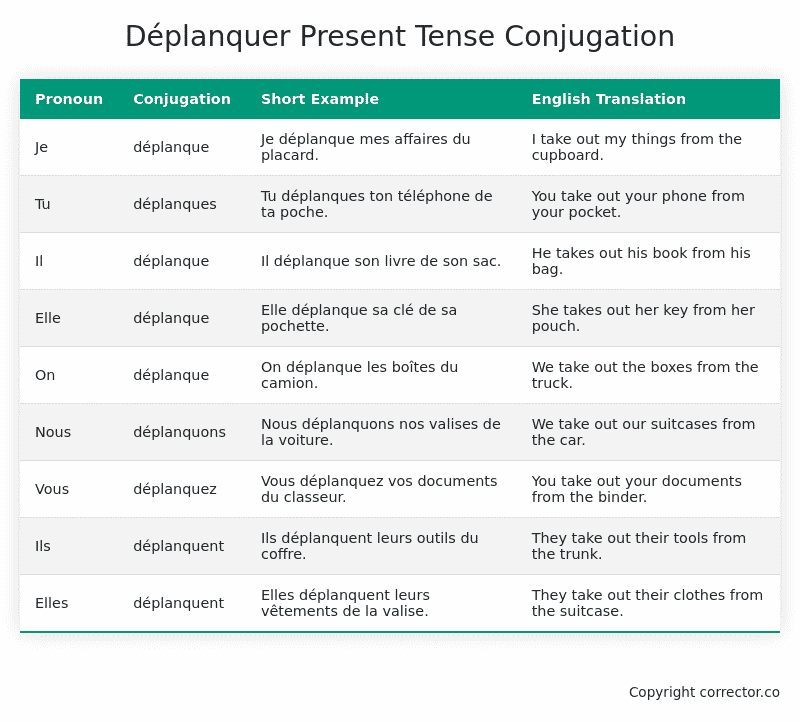Le Present (Present Tense) Conjugation of the French Verb déplanquer
Introduction to the verb déplanquer
The English translation of the French verb déplanquer is “to unhide” or “to uncover.” The infinitive form is pronounced as “dey-plahn-kay.”
Déplanquer is derived from the French word “planque,” which means “hiding place” or “hideout.” It is used in everyday French to describe the action of revealing or bringing something out of hiding.
Examples of usage:
- J’ai déplanqué mon vieux livre préféré de ma bibliothèque. (I uncovered my old favorite book from my library.)
- Il a déplanqué une bouteille de champagne pour fêter la réussite de son examen. (He brought out a bottle of champagne to celebrate his exam success.)
- Nous avons déplanqué les décorations de Noël du grenier. (We unhid the Christmas decorations from the attic.)
Note: The translations provided are approximate and may vary depending on the context.
Déplanquer – About the French Present Tense
To take a deep dive into all the French tenses then see our article on Mastering French Tense Conjugation.
Common Everyday Usage Patterns For Le Present
Interactions with Other Tenses
Table of the Present Tense Conjugation of déplanquer
| Pronoun | Conjugation | Short Example | English Translation |
|---|---|---|---|
| Je | déplanque | Je déplanque mes affaires du placard. | I take out my things from the cupboard. |
| Tu | déplanques | Tu déplanques ton téléphone de ta poche. | You take out your phone from your pocket. |
| Il | déplanque | Il déplanque son livre de son sac. | He takes out his book from his bag. |
| Elle | déplanque | Elle déplanque sa clé de sa pochette. | She takes out her key from her pouch. |
| On | déplanque | On déplanque les boîtes du camion. | We take out the boxes from the truck. |
| Nous | déplanquons | Nous déplanquons nos valises de la voiture. | We take out our suitcases from the car. |
| Vous | déplanquez | Vous déplanquez vos documents du classeur. | You take out your documents from the binder. |
| Ils | déplanquent | Ils déplanquent leurs outils du coffre. | They take out their tools from the trunk. |
| Elles | déplanquent | Elles déplanquent leurs vêtements de la valise. | They take out their clothes from the suitcase. |
Other Conjugations for Déplanquer.
Le Present (Present Tense) Conjugation of the French Verb déplanquer (You’re reading it right now!)
Imparfait (Imperfect) Tense Conjugation of the French Verb déplanquer
Passé Simple (Simple Past) Tense Conjugation of the French Verb déplanquer
Passé Composé (Present Perfect) Tense Conjugation of the French Verb déplanquer
Futur Simple (Simple Future) Tense Conjugation of the French Verb déplanquer
Futur Proche (Near Future) Tense Conjugation of the French Verb déplanquer
Plus-que-parfait (Pluperfect) Tense Conjugation of the French Verb déplanquer
Passé Antérieur (Past Anterior) Tense Conjugation of the French Verb déplanquer
Futur Antérieur (Future Anterior) Tense Conjugation of the French Verb déplanquer
Subjonctif Présent (Subjunctive Present) Tense Conjugation of the French Verb déplanquer
Subjonctif Passé (Subjunctive Past) Tense Conjugation of the French Verb déplanquer
Subjonctif Imparfait (Subjunctive Imperfect) Tense Conjugation of the French Verb déplanquer
Subjonctif Plus-que-parfait (Subjunctive Pluperfect) Tense Conjugation of the French Verb déplanquer
Conditionnel Présent (Conditional Present) Tense Conjugation of the French Verb déplanquer
Conditionnel Passé (Conditional Past) Tense Conjugation of the French Verb déplanquer
Conditionnel Passé II (Conditional Past II) Tense Conjugation of the French Verb déplanquer
L’impératif Présent (Imperative Present) Tense Conjugation of the French Verb déplanquer
L’impératif Passé (Imperative Past) Tense Conjugation of the French Verb déplanquer
L’infinitif Présent (Infinitive Present) Tense Conjugation of the French Verb déplanquer
L’infinitif Passé (Infinitive Past) Tense Conjugation of the French Verb déplanquer
Le Participe Présent (Present Participle) Tense Conjugation of the French Verb déplanquer
Le Participe Passé (Past Participle) Tense Conjugation of the French Verb déplanquer
Struggling with French verbs or the language in general? Why not use our free French Grammar Checker – no registration required!
Get a FREE Download Study Sheet of this Conjugation 🔥
Simply right click the image below, click “save image” and get your free reference for the déplanquer present tense conjugation!

I hope you enjoyed this article on the verb déplanquer. Still in a learning mood? Check out another TOTALLY random French verb present conjugation!


